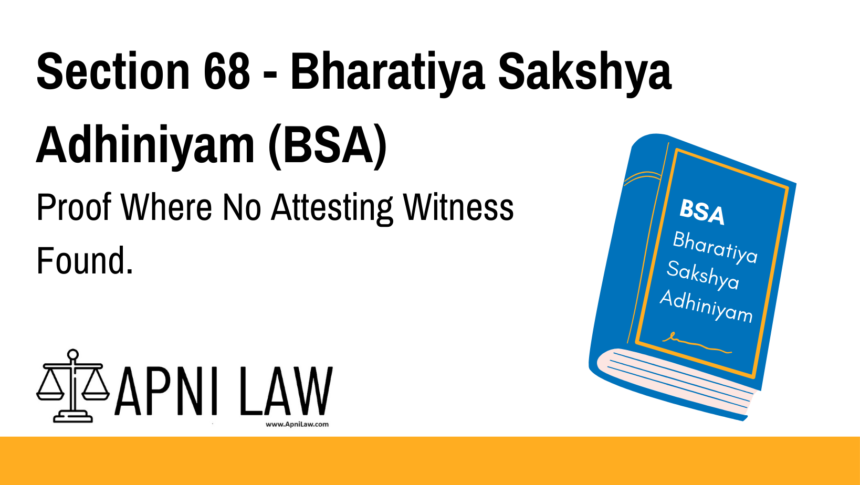Code: Section 68 – Bharatiya Sakshya Adhiniyam, 2023 (BSA)
If no such attesting witness can be found, it must be proved that the attestation
of one attesting witness at least is in his handwriting, and that the signature of the person
executing the document is in the handwriting of that person.
Explanation of Section 68 BSA
Section 68 of the Bharatiya Sakshya Adhiniyam provides a legal alternative for proving the execution of an attested document when attesting witnesses are unavailable.
Under Section 67, the general rule is that an attested document (such as a will or mortgage) must be proved by calling at least one attesting witness to testify in court. However, Section 68 applies in situations where no attesting witness can be found — whether due to death, disappearance, or incapacity.
In such cases, the law allows the document to be proved by establishing two facts:
-
That the attestation was indeed done by an attesting witness, and
-
That the handwriting of both the attesting witness and the person executing the document (signatory) is genuine.
This provision ensures that a document can still be accepted as valid evidence even when direct testimony is unavailable, provided other reliable proof (such as handwriting verification) is submitted.
Illustration
Example:
A will was signed by two witnesses, but by the time the will is brought to court, both witnesses are deceased. The court allows the party relying on the will to submit expert analysis confirming:
-
That the attestation is in the handwriting of one of the witnesses, and
-
That the testator’s signature is genuine.
If these are proved, the will can be accepted as valid evidence under Section 68 BSA.
Common Questions and Answers on Section 68 BSA
-
When does Section 68 apply? Section 68 applies only when no attesting witness can be found or is available to testify in court.
-
What kind of proof is acceptable under Section 68? Proof can be provided by handwriting experts, forensic analysis, or other documentary evidence showing that:
-
The attestation is in the handwriting of one of the attesting witnesses.
-
The document was signed by the person who is said to have executed it.
-
Does Section 68 override Section 67? No. Section 68 only acts as an exception when witnesses cannot be located or brought to court. Section 67 still governs the normal process when witnesses are available.
-
Is handwriting verification enough to admit a will into evidence? If no attesting witnesses are available, yes. But courts may scrutinize the evidence more strictly, especially in the case of wills.
-
Can a document be rejected if handwriting proof is inconclusive? Yes. If the court is not satisfied that the handwriting belongs to the attesting witness and the signatory, it may refuse to admit the document as evidence.
Conclusion
Section 68 of the Bharatiya Sakshya Adhiniyam provides a practical solution for proving important attested documents when witnesses cannot be found. It emphasizes the importance of secondary evidence such as handwriting analysis to ensure that justice is not obstructed by the unavailability of witnesses.
This section complements the evidentiary framework set out in Sections 66 and 67, maintaining both the reliability and the flexibility of the legal process.
For more detailed legal explanations and updates on the Bharatiya Sakshya Adhiniyam, visit ApniLaw.








